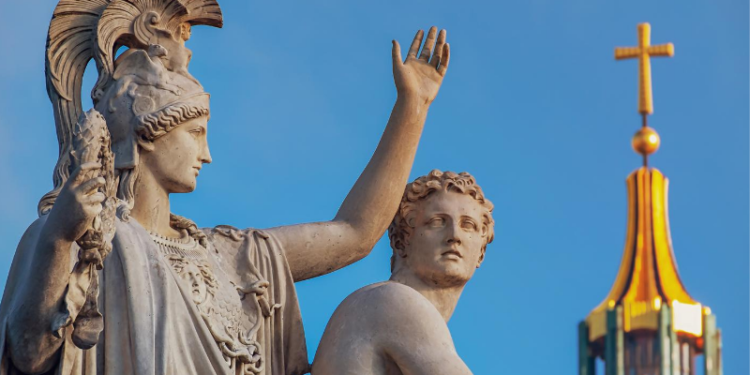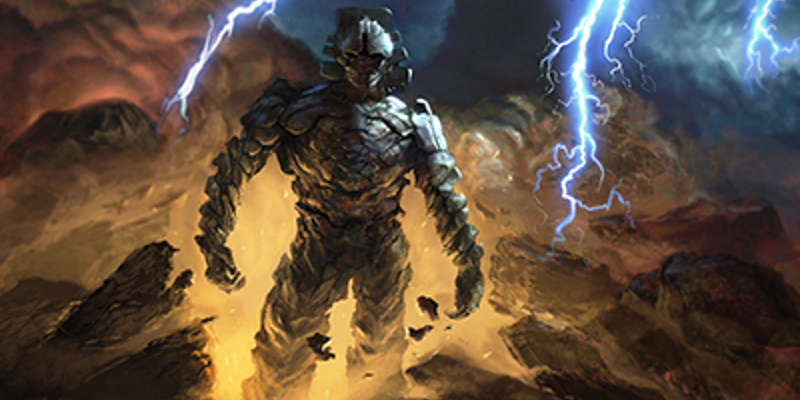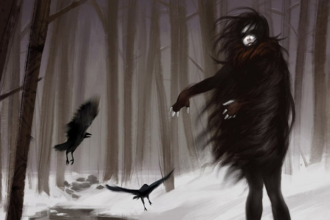Building a Pantheon: How to Choose Your Gods

Today we start a new series in worldbuilding focusing on a heavenly subject: creating pantheons for your tabletop roleplaying game. When creating a new world to play Dungeons and Dragons 5e, or any fantasy TRPG, the gods and the role they play in the world can be the key to an entire campaign.
Through this series, we’ll be looking at what to consider when creating a pantheon for your setting and giving it depth. Shaping the gods to be something more than a game mechanic for the clerics or paladins can give yourself storyhooks and give the game world a better sense of reality.
We’ll also develop a pantheon of our own throughout as an example. Let’s start with what to consider when first setting out in creating a campaign.
Creating Base Assumptions
Before you even begin creating individual gods, you should consider what base assumptions about how the gods interact with the material world. Start by answering these questions:
- What is the extent of their influence? Do they directly intervene or are they restricted to operating through their human representatives?
- Do all the different cultures and societies in the game world worship the same gods, just under different names and traditions? Or, are there distinct gods for each culture group?
- What is the relationship between the good-aligned divine forces and the evil-aligned demons? Are they locked in an eternal battle of good versus evil or is it more nuanced than that?
For the purposes of this article series, let’s go with the following assumptions:
- Gods and demons cannot directly intervene in mortal events, relying on mortal operatives to accomplish their goals.
- Each culture worships their own pantheon, but the pantheons could be seen as different versions of a set of gods. Each culture interprets them differently, and sometimes combine aspects of two gods, or emphasize one aspect over another. Which gods are given reverence varies from culture to culture.
- While not locked in a direct war against the forces of evil, the good-aligned beings seek in general to better the world for mortals while evil-aligned beings seek to harm, control, or destroy the world.
Gods Reflect The Society They Originate From
If you truly want to create a unique feeling pantheon, you need to know about the society that worships them. In our game world, the gods cannot directly intervene, so the perception of the gods is shaped through the lens of culture. Definite facts about them are hard to come by, and often their true nature and motivations are incomprehensible to mortals (and players).
So let’s start by establishing three essential aspects of our society. Let’s start by picking a race to create a pantheon for. How about elves?
What Does The Society Value?
Each society has values that help define and shape it. These values show up in their art, in their clothing, and in what material goods are prioritized to be made.
Values can be something like Hospitality, or something more concrete like Nature. These values can help serve as a launchpad for what deities to create to reflect these values back to the society. Once chosen, you can easily create a god for each value and call it a day.
Or, you can combine them in unique combinations so that each god embodies multiple aspects of what the society views as worthy, good, and an example to be lived up to.
For the elves, let’s stick with some traditionally elven values:
- Balance with Nature
- Hunting & Wildcraft
- Magic
- Beauty
- Excellence
Of these values, the most important is Excellence. After all, elves live for hundreds of years, so a step beyond mastery into excellence is highly valued. Those who do achieve this excellence are held up to be exemplars of what it means to be truly elven.
Creating Gods from Values & Archetypes.
So, using the ideal of Excellence as a primary one, we can create gods that embody true excellence in each of the other values. We can also combine some archetypes to create some truly mythic potential gods. So let’s go with:
- The Hunter Youth
- The Warrior Maiden
- The Tree Lord (maybe a kind of father figure)
- The Reborn Goddess
- The Sage/Magician
- The Crone
You can create gods directly from each of these potential gods, or refine them by adding in the material conditions of the society.
Creating Gods from Material Conditions
We can also create some mythic archetypes based on areas of production required to run the society. Basically, think about what activities the members of society undertake in order to reproduce or continue society. What do they do to make life happen?
Elves have four primary activities they do to survive:
- Hunt & gather food
- Tend to their homes
- Develop and use magic
- Craft weapons, armor, and other items
So from here we could mix in the primary value of Excellence and create gods that are:
- Master of the Hunt
- Master of the Hearth
- Master of the Mind
- Master of the Forge
Combining these with the archetypes we created out of values can give us our initial pantheon (I also started making a simple elvish naming language to create the different names of the gods):
- Mahervjoth, the Allmother
- Epithets: Ammaherlith, the Great Mother, Täväräth, the Scattered One
- Purview: Personification of the Earth and Sky, of all the natural world. The progenitor of the other gods. Slain by Blackwolf.
- Selaryndirith, The Tree Lord:
- Epithets: Edhakälärä, Growing Man, Vathador, Father of Groves
- Purview: Nature, balance with nature, Favored by the Wood Elves
- Domains: Life, Nature, Tempest
- Faranvallith, The Magic Sun
- Epithets: Valpihtalir, Light of Knowledge, Smiling Archer,
- Purview: Magic, arcane magic, light, favored by the High Elves
- Domains: Arcane, Light, Order
- Hermaphroditic
- Uhrafasdirith, The Moon Huntress
- Purview: the Hunt, the Night, Chaotic elements of society, Secrets, War, the Drow
- Domains: Trickery, Knowledge, War
- The Reborn Goddess
- Purview: Goddess of the Souls, Queen of Twilight, Allmother Reborn
- Domains: Death, Grave, Twilight
- Kruvaarhtoth, The Blackwolf
- Purview: Goddess of chaos, ate the Allmother, and vomited her up again, creating the world.
- Not worshipped, as it was killed by the Old Man Smith, but the Blackwolf’s pups are taken into the care of the Moon Huntress
- The Old Man Smith
- The eldest child of Allmother, Guardian of the Elves, Bound the remains of All mother to make the world.
- Purview: Forge, Protection, Unity
Next week we will continue the series with how to create universal gods. Let me know if you think this method helps create new and fun pantheons for your game!



